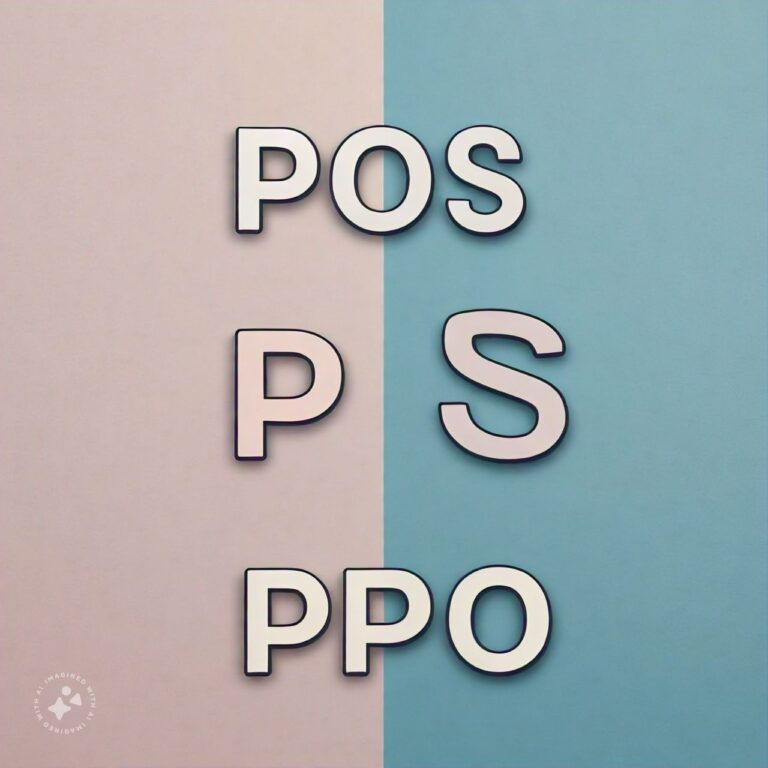
Differences Between PPO (Preferred Provider Organization) and POS (Point of Service)
When it comes to healthcare plans in the United States, choosing the right insurance plan is crucial for individuals and families. Two common types of health plans are PPO (Preferred Provider Organization) and POS (Point of Service) plans. These plans offer different structures for how healthcare services are accessed and reimbursed. While PPOs and POS plans are typically thought of in the context of health insurance, there is a growing interest in understanding how they affect health investment options, especially for people who are considering how to manage their health expenses for long-term savings.
Investment PPOs and POS plans refer to health insurance structures that allow individuals to choose healthcare providers either inside or outside of a network, with differences in cost-sharing and flexibility in selecting providers. These plans may also integrate with health savings accounts (HSAs) or flexible spending accounts (FSAs), which allow individuals to invest money tax-free for future medical expenses.
This article provides a comprehensive overview of investment PPOs and POS plans, including how they function, their key differences, and how they can impact healthcare investment decisions. It will also answer frequently asked questions about these health plans to help clarify which option may be best for you.
PPO (Preferred Provider Organization) Overview
What is an Investment PPO?
A Preferred Provider Organization (PPO) plan is a type of health insurance plan that provides policyholders with a network of preferred healthcare providers, such as doctors, specialists, and hospitals. Individuals who enroll in a PPO can choose to receive care from in-network providers, which are pre-negotiated with the insurance company, or from out-of-network providers, though the cost of out-of-network care is usually higher. PPO plans offer more flexibility in selecting healthcare providers without needing a referral to see a specialist, making them a popular choice for people who want greater control over their healthcare choices.
An investment PPO refers to a PPO plan that integrates with health investment options, such as Health Savings Accounts (HSAs) or Flexible Spending Accounts (FSAs), which allow individuals to save money for healthcare expenses on a tax-advantaged basis. These accounts enable individuals to invest in their healthcare while enjoying tax savings.
Key Features of Investment PPO
- Flexibility in Provider Choice: PPO plans allow you to see both in-network and out-of-network providers without needing a referral from a primary care physician (PCP). This flexibility is especially valuable for individuals who want more control over their healthcare or need to see specialists frequently.
- Higher Costs for Out-of-Network Care: While PPOs allow out-of-network care, it usually comes with higher out-of-pocket costs. However, in-network care typically has lower copayments, coinsurance, and deductibles.
- No Need for Referrals: PPOs do not require policyholders to get a referral from a primary care physician to see a specialist. This means that individuals can directly access specialists when needed, which can expedite care and improve healthcare outcomes.
- Health Savings Accounts (HSAs) Compatibility: Many PPO plans can be paired with HSAs, allowing individuals to save and invest pre-tax dollars for future healthcare expenses. HSAs provide triple tax advantages—contributions, growth, and withdrawals for qualified medical expenses are all tax-free.
- Employer-Sponsored Plans: PPOs are often available through employer-sponsored health plans, making them a common choice for employees seeking comprehensive healthcare coverage with investment options for healthcare savings.
- Preventive Care: PPOs typically cover preventive services, such as annual check-ups, vaccinations, and screenings, often without requiring copayments, as long as care is provided by an in-network provider.
- Investment Potential: When paired with an HSA, a PPO plan allows policyholders to invest unused healthcare funds in various financial instruments, such as stocks, bonds, and mutual funds, to grow their healthcare savings over time.
Advantages of Investment PPO Plans
- Greater Flexibility: PPO plans offer the freedom to choose any healthcare provider, whether in-network or out-of-network, without needing referrals. This makes PPOs ideal for individuals who value flexibility and direct access to specialists.
- No Need for Primary Care Referrals: Policyholders can visit specialists without a referral, streamlining access to specialized care.
- Tax-Advantaged Savings: When paired with an HSA, investment PPOs allow individuals to save and invest pre-tax dollars for future healthcare needs, which can help build long-term healthcare savings.
- Comprehensive Coverage: PPOs often provide comprehensive coverage, including preventive care, specialty care, and out-of-network options.
- Investment Growth: HSAs associated with PPOs offer the opportunity to invest in various assets, allowing healthcare funds to grow over time, providing financial security for future medical expenses.
Limitations of Investment PPO Plans
- Higher Premiums: PPOs tend to have higher monthly premiums compared to other health insurance plans like HMOs or POS plans. The increased flexibility in provider choice comes at a higher cost.
- Higher Out-of-Network Costs: While PPOs allow out-of-network care, the cost-sharing is higher for out-of-network providers, leading to increased out-of-pocket expenses for the insured.
- Complex Cost Structure: The cost structure of PPOs can be more complex, with different rates for in-network and out-of-network care, varying deductibles, copays, and coinsurance levels.
- Limited Availability of HSAs: Not all PPOs are eligible for pairing with an HSA, as only high-deductible health plans (HDHPs) qualify for HSA use.
Common Uses of Investment PPO Plans
- Frequent Specialist Care: PPO plans are ideal for individuals who frequently need to see specialists without going through the referral process.
- Those Seeking Greater Healthcare Control: Individuals who value the freedom to choose their healthcare providers—whether in-network or out-of-network—prefer PPOs.
- People Interested in Health Savings: Individuals looking to invest in their healthcare savings through an HSA often choose PPO plans to maximize their tax benefits and investment potential.
POS (Point of Service) Overview
What is a POS Plan?
A Point of Service (POS) plan is a type of managed care health insurance that combines features of both Health Maintenance Organization (HMO) plans and Preferred Provider Organization (PPO) plans. POS plans require policyholders to select a primary care physician (PCP) who manages and coordinates their care. To see a specialist or access certain medical services, a referral from the PCP is usually required. However, unlike HMOs, POS plans offer out-of-network coverage, though at a higher cost to the policyholder.
While POS plans may not typically be associated with investment options like PPOs, they can also be paired with tax-advantaged healthcare accounts, such as FSAs or HSAs, depending on whether they qualify as high-deductible health plans.
Key Features of POS Plans
- Primary Care Physician (PCP) Requirement: POS plans require policyholders to select a PCP who acts as the gatekeeper for medical care. The PCP coordinates healthcare services and provides referrals for specialists.
- Referral-Based System: To see a specialist or receive certain treatments, POS plan members typically need a referral from their PCP. This helps manage care and ensures that services are medically necessary.
- Out-of-Network Coverage: POS plans allow policyholders to receive care from out-of-network providers, but at a higher cost than in-network care. This provides some flexibility, though the primary focus remains on in-network services.
- Lower Costs for In-Network Care: POS plans tend to have lower out-of-pocket costs for in-network care, such as lower deductibles, copayments, and coinsurance, compared to PPOs.
- Flexibility with Specialist Care: While referrals are required for specialist care, POS plans offer more flexibility than HMOs in that members can still seek out-of-network providers, albeit at a higher cost.
- Limited Investment Options: POS plans may or may not be eligible for pairing with an HSA, depending on whether they meet the criteria for a high-deductible health plan. However, many POS plans can be paired with an FSA, which allows for tax-advantaged savings for medical expenses.
- Managed Care Approach: POS plans blend the managed care aspects of HMOs with the flexibility of PPOs, offering a balance of cost savings and provider choice, particularly for in-network services.
Advantages of POS Plans
- Lower Costs for In-Network Care: POS plans generally have lower out-of-pocket costs for in-network services, making them a cost-effective option for individuals who are comfortable receiving care within a network.
- Flexibility for Out-of-Network Care: POS plans offer some flexibility by allowing members to seek out-of-network care, though at a higher cost. This provides more choice compared to an HMO, which usually does not cover out-of-network services.
- Coordinated Care: With the PCP managing care, POS plans provide more coordinated healthcare services, helping ensure that all treatments and referrals are medically necessary.
- Affordable Premiums: POS plans often have lower premiums than PPOs, making them more affordable for individuals and families who prioritize cost savings over extensive provider flexibility.
- Access to Out-of-Network Care: While referrals are needed, POS plans still allow access to out-of-network care, providing more options than HMO plans.
Limitations of POS Plans
- Referral Requirement: POS plans require referrals for most specialist care, which can slow down the process of getting the care you need, especially in urgent situations.
- Higher Out-of-Network Costs: While POS plans allow out-of-network care, the costs are significantly higher than in-network care, which can make out-of-network services prohibitively expensive for some.
- Limited Investment Options: POS plans may not always be eligible for HSA pairing, as they are not always considered high-deductible health plans.
- Less Flexibility than PPOs: While POS plans offer more flexibility than HMOs, they are still more restrictive than PPOs when it comes to accessing specialist care without referrals and using out-of-network providers.
Common Uses of POS Plans
- Individuals Seeking Lower Premiums: POS plans are ideal for individuals who want affordable premiums but still desire the flexibility to see out-of-network providers if needed.
- People Who Prefer Coordinated Care: Those who want a primary care physician to manage and coordinate their healthcare services will benefit from the managed care approach of a POS plan.
- Families Who Primarily Use In-Network Providers: POS plans are well-suited for families who mainly use in-network providers and do not require frequent specialist care.
Differences Between PPO (Preferred Provider Organization) and POS (Point of Service)
While both PPO and POS plans offer access to a network of healthcare providers and allow out-of-network care, they differ in several key areas:
- Provider Flexibility:
- PPO: Offers the most flexibility in choosing healthcare providers. Members can see any in-network or out-of-network provider without referrals, making it ideal for individuals who want control over their healthcare decisions.
- POS: Requires a referral from a primary care physician to see specialists, and while out-of-network care is allowed, it comes with higher costs. POS plans offer less flexibility compared to PPOs.
- Referrals:
- PPO: Does not require referrals to see specialists, making it easier to access specialty care directly.
- POS: Requires referrals from a PCP to see specialists, adding an additional step in the process of receiving specialist care.
- Cost Structure:
- PPO: Typically has higher premiums but provides more flexibility with out-of-network care. Out-of-network services are more expensive, but the plan covers a portion of the cost.
- POS: Generally has lower premiums than PPOs and lower costs for in-network care, but higher out-of-pocket costs for out-of-network services.
- Out-of-Network Care:
- PPO: Allows out-of-network care with higher cost-sharing than in-network care but does not require referrals.
- POS: Offers out-of-network care, but it is more expensive than in-network care, and the member typically must pay a higher percentage of the costs.
- Investment Options:
- PPO: Can be paired with an HSA if it qualifies as a high-deductible health plan, providing investment options for tax-advantaged healthcare savings.
- POS: May not always be eligible for HSA pairing but can often be paired with an FSA for tax savings on medical expenses.
- Primary Care Physician (PCP) Requirement:
- PPO: No requirement to select a PCP or obtain referrals.
- POS: Requires selecting a PCP and obtaining referrals for specialist care.
- Premiums:
- PPO: Typically has higher premiums due to the greater flexibility in provider choice and lack of referral requirements.
- POS: Generally has lower premiums, making it a more affordable option for individuals who primarily use in-network services.
- Coordinated Care:
- PPO: Does not require a coordinated care approach, meaning members manage their own healthcare decisions.
- POS: Offers a more coordinated care approach, with the PCP overseeing and coordinating healthcare services.
Conclusion
Both PPO and POS plans offer valuable healthcare coverage options, but they cater to different needs and preferences. PPOs provide greater flexibility, allowing individuals to see any provider without a referral and offering access to out-of-network care. They also pair well with HSAs, giving policyholders the opportunity to invest and grow their healthcare savings over time. However, PPOs come with higher premiums and out-of-network costs.
POS plans, on the other hand, require more coordination, as policyholders need to select a primary care physician and obtain referrals for specialist care. While POS plans are more restrictive than PPOs, they offer lower premiums and still allow access to out-of-network care, albeit at a higher cost. Some POS plans may be paired with FSAs or HSAs, depending on their structure.
Ultimately, the choice between a PPO and POS plan depends on your healthcare needs, budget, and preferences for provider flexibility versus managed care. Understanding the differences between these plans allows you to make an informed decision about which option best fits your long-term healthcare and investment goals.
FAQs
Related Topics
- All
- Animals
- Diseases
- Health
- Money
- Politics
© 2024 OnYelp.com. All rights reserved. Terms and Conditions | Contact Us | About us





